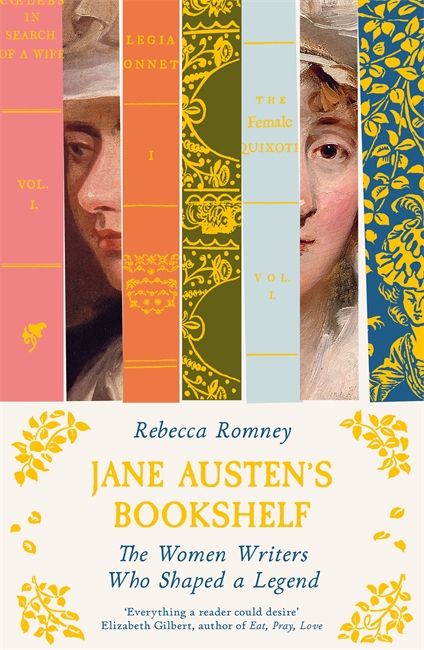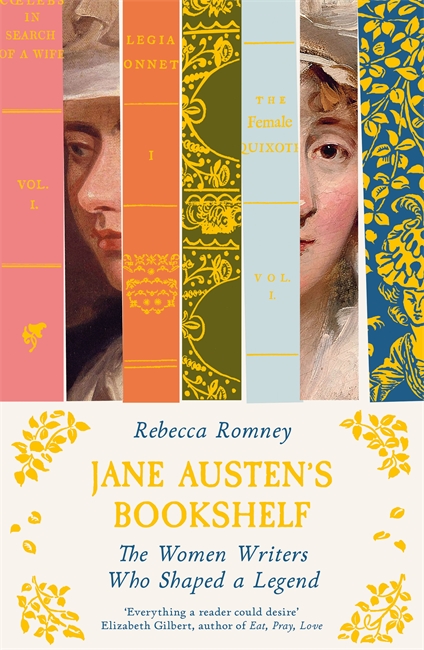
Jane Austen's Bookshelf
Imprint: Ithaka
Synopsis
'Everything a reader could desire: wit, passion, mystery, brilliant detective work, a love of rare books, a deep dive into literary history and, best of all, the restoration of reputation for a group of great women authors whose names should never have been forgotten' Elizabeth Gilbert, author of Eat, Pray, Love
Publishing to coincide with the 250th anniversary of Jane Austen's birth.
It all started with a book that made me curious.
When rare books dealer Rebecca Romney found an emerald clothbound edition of Evelina by Frances Burney, she was happy to discover that she'd stumbled across a novel by one of Jane Austen's favourite authors. Inspired by the connection between the two writers, she returned to Austen's books with a new lens, picking out clues sprinkled throughout her works that pointed to the writers she had admired.
Austen read William Shakespeare, John Milton, Daniel Defoe, and Samuel Richardson, all authors Rebecca had read. But Austen also read Frances Burney, Ann Radcliffe, Charlotte Lennox, Hannah More, Charlotte Smith, Elizabeth Inchbald, Hester Piozzi, and Maria Edgeworth, all authors Romney hadn't. These female writers all sat proudly on Austen's bookshelf, but have disappeared from ours.
Romney became fascinated with these writers and wanted to answer three important questions: What were the stories behind the lives of these women? Why have they disappeared from our bookshelves? Who wrote them out of history? She had a mission, an obligation: she needed to collect Jane Austen's bookshelf.
Publishing to coincide with the 250th anniversary of Jane Austen's birth.
It all started with a book that made me curious.
When rare books dealer Rebecca Romney found an emerald clothbound edition of Evelina by Frances Burney, she was happy to discover that she'd stumbled across a novel by one of Jane Austen's favourite authors. Inspired by the connection between the two writers, she returned to Austen's books with a new lens, picking out clues sprinkled throughout her works that pointed to the writers she had admired.
Austen read William Shakespeare, John Milton, Daniel Defoe, and Samuel Richardson, all authors Rebecca had read. But Austen also read Frances Burney, Ann Radcliffe, Charlotte Lennox, Hannah More, Charlotte Smith, Elizabeth Inchbald, Hester Piozzi, and Maria Edgeworth, all authors Romney hadn't. These female writers all sat proudly on Austen's bookshelf, but have disappeared from ours.
Romney became fascinated with these writers and wanted to answer three important questions: What were the stories behind the lives of these women? Why have they disappeared from our bookshelves? Who wrote them out of history? She had a mission, an obligation: she needed to collect Jane Austen's bookshelf.
Details
464 pages
Imprint: Ithaka
Reviews
'Jane Austen's Bookshelf is brilliant stuff - a bold bit of canon jujitsu, sparked by the simplest of questions'Observer
'In [Romney's] expert hands we rediscover not just the stories that Austen grew up reading but a forgotten generation denied their rightful place in literary history. Edgeworth, Radcliffe, Burney and a host of other authors burst off the page, restored to vivid life: a sisterhood to whom Austen herself aspired to belong and who can help us, as readers, to understand her better.'Helena Kelly, Author of Jane Austen, The Secret Radical
'An absolute treasure trove of women's literature'Jessica Bull, author of Miss Austen Investigates
'[A] gem of passionate criticism.... Jane Austen's Bookshelf stirred some emotions of my own. My penciled exhortations in the margins, some of excitement or communion, others of irritation, are in a way a response to Romney's invitation to join in her intellectual tussling. It may be how new canons are formed; it's certainly how enthusiasms are shared'New York Times
